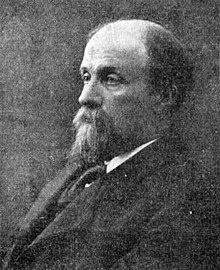Juhani Aho

Juhani Aho [ ˈjuhɑni ˈɑhɔ ], actually Juhani Brofeldt [ ˈbruːfɛlt ] (born September 11, 1861 in Lapinlahti ; † August 8, 1921 in Helsinki ), was a Finnish writer and journalist .
Life
Juhani Aho came from a pietistic family in which reading secular literature was not tolerated. His father Henrik Gustaf Theodor Brofeldt was provost in Lapinlahti; his mother was Karolina Fredrika Emelie Snellman. Aho studied history and literature in Helsinki from 1880 to 1884. During his studies he worked as a freelancer for various Finnish newspapers. He was also the co-founder of the Päivälehti newspaper . As a result, he was u. a. to one of the important personalities in Young Finland , a group that formulated new thoughts on society, art and morality in Finland in the 1880s. Invitations and trips to France and Russia followed.
Bjørnstjerne Bjørnson , Henrik Ibsen , Leo Tolstoy and Émile Zola gave him his first literary inspiration . Aho also continued the humanistic traditions of Finnish literature, like Aleksis Kivi or Minna Canth . His translations still have their meaning today.
Aho drew his themes from Finnish folk life and thus became a pioneer of modern Finnish realism.
In 1891 he married the painter Venny Soldan-Brofeldt and had two children with her: Heikki Aho (1895–1961) and Antti Juhani Aho (1900–1960). With Venny's sister Tilly he also fathered a son: Björn Soldan (1902–1953).
Juhani Aho passed away at the age of 59.
criticism
"Aho has a tender eye for the despised individualities of life, which means that he can feel sympathy not only for the new that is coming, but also for the old that is going."
According to Hans Marquardt , the attraction of his works is Ahos' “deep psychological empathy”.
Works
- Juha , 1911, German Heavy Blood, 1920
- Panu , 1897, German Panu. Pictures from the last battles of Christianity against paganism in Finland , 1899
- Papin rouva , 1893
- Yksin , 1890, German bachelor love and other short stories , ca.1913
- Hellmannin herra , 1886, German landowner Hellmann and other short stories , 1899
- Papin tytär , 1885, German Ellis Youth , 1899
- Rautatie , 1884, German The Railway , 1922
- Siihen aikaan kun isä lampun osti , 1884, German when father bought the lamp , 1900 (in: Die Zukunft , 1900, vol. 33, pp. 299–305)
Film adaptations
- 1921: Johan - Director: Mauritz Stiller
- 1937: Juha - Director: Nyrki Tapiovaara
- 1999: Juha - Director: Aki Kaurismäki
literature
- Ilmari Havu: Juhani Aho . Otava, Helsinki 1929.
- Kaarlo Nieminen: Juhani Ahon sanataide . University Press, Helsingfors 1934.
Web links
- Literature by and about Juhani Aho in the catalog of the German National Library
- All works by Projekt Gutenberg, as there is no longer any copyright
supporting documents
- ^ Hans Marquardt : Menschen im Frühling , Leipzig, Reclam Jun., 1974, p. 592
| personal data | |
|---|---|
| SURNAME | Aho, Juhani |
| ALTERNATIVE NAMES | Brofeldt, Juhani (real name) |
| BRIEF DESCRIPTION | Finnish writer and journalist |
| DATE OF BIRTH | September 11, 1861 |
| PLACE OF BIRTH | Lapinlahti |
| DATE OF DEATH | August 8, 1921 |
| Place of death | Helsinki |


